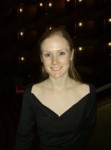Sylvia
2007. Opus Arte. DVD (all regions). 117 minutes. £24.99 Also available to rent via Digital Theatre.
About the reviewers:
 Dr Claire Brock is Lecturer in English, University of Leicester. Dr Brock’s research interests include gender and medicine (especially women surgeons), the history of surgery, nineteenth-century scientific literature, and medicine and literature in the nineteenth and early twentieth centuries. Her publications include two monographs: The Feminization of Fame, 1750-1830 (2006) and The Comet Sweeper: Caroline Herschel’s Astronomical Ambition (2007).
Dr Claire Brock is Lecturer in English, University of Leicester. Dr Brock’s research interests include gender and medicine (especially women surgeons), the history of surgery, nineteenth-century scientific literature, and medicine and literature in the nineteenth and early twentieth centuries. Her publications include two monographs: The Feminization of Fame, 1750-1830 (2006) and The Comet Sweeper: Caroline Herschel’s Astronomical Ambition (2007).
 Dr Ben Dew is Lecturer in English Literature at University of Potsmouth. Dr Brock’s research interests include gender and medicine (especially women surgeons), the history of surgery, nineteenth-century scientific literature, and medicine and literature in the nineteenth and early twentieth centuries. His publications include two edited volumes: Dew, Benjamin and Price, F., eds. (2014) Visions of history 1680-1830 (2014) and Ellis, M., Coulton, R., Dew, Benjamin and Mauger, M., eds. Tea and the tea-table in eighteenth-century England (2010).
Dr Ben Dew is Lecturer in English Literature at University of Potsmouth. Dr Brock’s research interests include gender and medicine (especially women surgeons), the history of surgery, nineteenth-century scientific literature, and medicine and literature in the nineteenth and early twentieth centuries. His publications include two edited volumes: Dew, Benjamin and Price, F., eds. (2014) Visions of history 1680-1830 (2014) and Ellis, M., Coulton, R., Dew, Benjamin and Mauger, M., eds. Tea and the tea-table in eighteenth-century England (2010).
This version of Sylvia was performed in December 2005 as part of the Royal Ballet’s 75th anniversary celebrations and stars Darcey Bussell in the title role. Tchaikovsky famously claimed that he would give up Wagner’s Ring cycle for the charm, elegance, rhythm, harmony and richness of melody that he found in Sylvia, and it is easy to see the reasons for the ballet’s continuing appeal. Set in a mythological world inhabited by an eclectic mix of gods, nymphs, shepherds, huntresses and the odd goat or two, Sylvia contains an enticing blend of Bacchanalian excess, mischievous and interfering deities, passionate lovers, and a fiendish villain. The story begins at Eros’ shrine, where the eponymous heroine is watched unknowingly by love-struck shepherd Aminta and the lust-filled Orion. Although Sylvia has sworn to renounce love, Eros has his revenge, causing her to fall for Aminta. Their union is then frustrated by a combination of Orion’s dastardly designs, Diana’s anger, and a series of unfortunately placed arrows. Act Three, however, sees the death of Orion and, on Diana’s approval, the resolution of the romantic plot as all ends happily for the reunited Aminta and Sylvia.
The production itself is exquisite. Elaborate and colourful set design and lavish costumes create a suitably fantastic atmosphere for the ballet’s otherworldly creatures. As Sylvia, Darcey Bussell brings elegance and poise, as well as successfully revealing the protagonist’s strength and resourcefulness. Roberto Bolle is an attractive Aminta, while Thiago Soares revels in Orion’s decadence and debauchery. The rousing score, conducted by Graham Bond, certainly justifies Tchaikovsky’s comments on its virtuosity.
Released nearly two years after the original performance, the DVD contains a number of extras which range from brief introductions to each Act by Darcey Bussell, aimed, perhaps, at a younger audience, to more in-depth historical and choreographic commentary. In the latter, former Royal Ballet dancer and the man responsible for Sylvia’s production realisation and staging, Christopher Newton, discusses the fascinating background to the ballet. That this version of Sylvia exists at all today is due to Newton’s recovery of it from obscurity. Léo Délibes’ original production of 1876 was revived by the founding choreographer of the Royal Ballet, Sir Frederick Ashton, in 1952, and starred Margot Fonteyn in the title role. Ashton’s increasing dissatisfaction with the ballet ensured that it was no longer performed in the Royal Ballet repertoire after the 1960s. By 1988, however, Ashton felt that the time was right for a revival and began to discuss the possibility of a new production with Newton. Ashton’s death, only three months after hopes of a restaging were raised, did not discourage Newton who, drawing on his own knowledge of the ballet, his conversations with Ashton and the discovery of a silent black and white recording of the original, was inspired to continue. After forty years without performance this delightful revival provides both a record of an important production in the history of the Royal Ballet and a befitting testament to Christopher Newton’s dedication.
Claire Brock & Ben Dew

 Learning on Screen
Learning on Screen